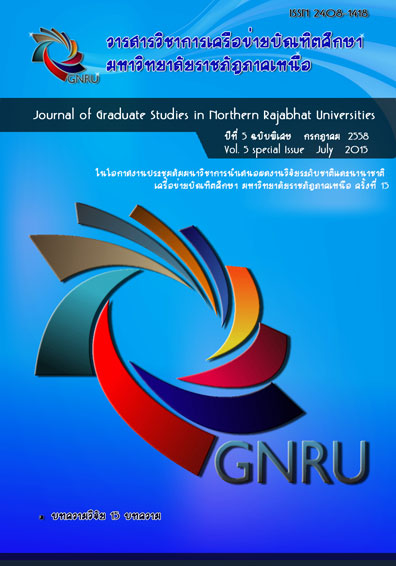การพัฒนากิจกรรมการจัดประสบการณ์การเรียนรู้แบบสืบเสาะหาความรู้โดยใช้สมองเป็นฐานที่มีต่อทักษะกระบวนการทางวิทยาศาสตร์ของเด็กปฐมวัยชั้นอนุบาลปีที่ 1 โรงเรียนบ้านวังหันน้ำดึง อำเภอคลองขลุง จังหวัดกำแพงเพชร; Development the Activities of inquiry Approach with
Main Article Content
Abstract
บทคัดย่อ
การวิจัยครั้งนี้ใช้แนวคิดในการดำเนินการวิจัยและพัฒนา (Research and Development) 2 ขั้นตอน คือ ขั้นตอนที่ 1 การวิจัย (Research: R) เพื่อสร้างและหาประสิทธิภาพของกิจกรรมการจัดประสบการณ์การเรียนรู้แบบสืบเสาะหาความรู้โดยใช้สมองเป็นฐานที่มีต่อทักษะกระบวนการทางวิทยาศาสตร์ของเด็กปฐมวัยชั้นอนุบาลปีที่ 1ขั้นตอนที่ 2 การพัฒนา (Development: D) เพื่อใช้และศึกษาผลการใช้กิจกรรมการจัดประสบการณ์การเรียนรู้แบบสืบเสาะหาความรู้โดยใช้สมองเป็นฐานที่มีต่อทักษะกระบวนการทางวิทยาศาสตร์ของเด็กปฐมวัยชั้นอนุบาลปีที่ 1โดย 2.1) เปรียบเทียบทักษะกระบวนการทางวิทยาศาสตร์ก่อนและหลังการใช้กิจกรรม 2.2) ศึกษาจิตวิทยาศาสตร์หลังได้รับการจัดกิจกรรม 2.3) ศึกษาระดับความสุขในการเรียนรู้หลังการใช้กิจกรรมกลุ่มตัวอย่างที่ใช้ในการวิจัยคือเด็กปฐมวัยชั้นอนุบาลปีที่ 1 ภาคเรียนที่ 2 ปีการศึกษา 2557 จำนวน 14 คน โรงเรียนบ้านวังหันน้ำดึง อำเภอคลองขลุง จังหวัดกำแพงเพชร สำนักงานเขตพื้นที่การศึกษาประถมศึกษากำแพงเพชรเขต 2 ซึ่งได้มาโดยการเลือกแบบเจาะจง (Purposive Sampling) เครื่องมือที่ใช้ในการวิจัยได้แก่ 1) กิจกรรมการจัดประสบการณ์การเรียนรู้แบบสืบเสาะหาความรู้โดยใช้สมองเป็นฐาน2) แบบทดสอบวัดทักษะกระบวนการทางวิทยาศาสตร์3)แบบประเมินจิตวิทยาศาสตร์ของเด็กปฐมวัยที่มีต่อกิจกรรม 4) แบบวัดระดับความสุขในการเรียนรู้ของเด็กปฐมวัยที่มีต่อกิจกรรมวิเคราะห์ข้อมูลโดยใช้ค่าเฉลี่ย () ส่วนเบี่ยงเบนมาตรฐาน (S.D.) สถิติการทดสอบ t-test Dependent Sample
ผลการวิจัยพบว่า 1) กิจกรรมการจัดประสบการณ์การเรียนรู้แบบสืบเสาะหาความรู้โดยใช้สมองเป็นฐานที่มีต่อทักษะกระบวนการทางวิทยาศาสตร์ของเด็กปฐมวัยชั้นอนุบาลปีที่ 1 มีความเหมาะสมในระดับมากและมีประสิทธิภาพเท่ากับ 86.29/84.00 2) ทักษะกระบวนการทางวิทยาศาสตร์ขอเด็กปฐมวัยหลังเรียนสูงกว่าก่อนเรียนด้วยกิจกรรมอย่างมีนัยสำคัญทางสถิติที่ระดับ .05 3) จิตวิทยาศาสตร์หลังได้รับการจัดกิจกรรมของเด็กปฐมวัยอยู่ในระดับมาก 4) ระดับความสุขในการเรียนรู้หลังได้รับการจัดกิจกรรมของเด็กปฐมวัยอยู่ในระดับมาก
Abstract
This research used the Research and Development concept, they were divided into two steps. Step 1 Research: R was for construction and evaluation of inquiry approach with brain based learning on science process skill of preschool children. Step 2 Development: Dwas for using and studied the usage result of inquiry approach with brain based learning on science process skill of preschool, by 2.1) contrasted science process skill before and after attended the activities. 2.2) Studied the scientific mind after attended the activities. 2.3) Studied the level of happiness in learning after attended the activities, The sample that used in this research were 14 of preschool of the 2nd semester, school year 2014 in BAN Wanghunnamdung School AmphurKhlongkhlungChangwatKampaengPhet, under Kampaengphet Primary Educational Service Area Office 2 by purposive sampling. Patterns in this research were 1) Activities of inquiry approach with brain based Learning. 2) Science process skills tests. 3) Evaluation form of science process skill of preschool children on the activities. 4) A measure form of happiness in learning of preschool on the activities. The data were analysis bymean (), standard deviation (S.D.) and t-test dependent sample.
The result of this research found the 1) The activities of inquiry approach with brain based learning on science process skill of children were considered appropriate at high level and effectiveness were 86.29/84.00. 2) Science process skill ofpreschool children after learning was higher than before learning by activities were statistical significant at level .05. 3) Scientific mind of preschool children after the activities were considered at high level. 4) The level of happiness in learning of preschool after was considered at high level.

